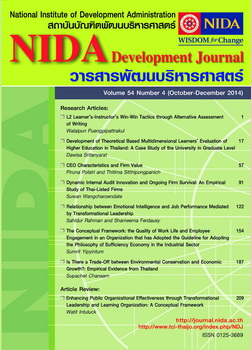L2 Learner’s-Instructor’s Win-Win Tactics through Alternative Assessment of Writing
DOI:
https://doi.org/10.14456/ndj.2014.5Keywords:
Alternative assessment, writing, dialogue journals, ThailandAbstract
The utilization of alternative assessment with English-language achievement and proficiency tests in Thai higher education has been few and far between. This study aimed at examining English-language writing skill development, particularly in fluency of written content and ideas, of L2 learners from a Thai university. To comprehend the tacit knowledge of English of the voluntary 1st-year undergraduate Thai learners who had difficulties in producing ideas in English language writing, the study utilized an alternative assessment of writing in the form of dialogue journals.
Based on the authenticity as an outstanding feature of dialogue journals, the qualitative results supporting the quantitative ones, in the triangulated study, are derived from the content analysis of journal entries and interview responses. The results revealed some L2 learning strategies and implicit learning stages of the learners and their views of the use of dialogue journals. Discussion and implications for ways to utilize alternative assessment to enhance L2 learners’ English language writing skills are provided for L2 learning and teaching communities.





